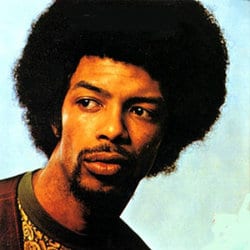
A Look Back in Anger: Poet-Prophet Gil Scott-Heron
NEW YORK – American soldiers patrol the villages and valleys of a distant land in search of an elusive enemy. The White House calls it a war of necessity. Protesters call it business as usual.
Congress debates health care. The stock market slumps. Homelessness and hunger rise. Black Power stirs resentment.
With the budget spiraling out of control to finance an ambitious domestic and foreign policy agenda, multi-billion dollar missions to outer space captivate scientists and horrify advocates for the poor.
The end of the first decade of the 21st century?
Try 40 years ago – 1969, with Vietnam, Richard Nixon and lunar exploration in place of Afghanistan, Barack Obama, and missions to Mars.
In the wake of that decade of revolution and riots, social change and economic malaise, few artists better captured the contrasts and contradictions of a country wrestling with its soul than Gil Scott-Heron.
And no one better pierced the veil of saccharine self-congratulation over the July 20, 1969, lunar landing than Scott-Heron, whose searing proto-rap ballad, “Whitey on the Moon” turned the accomplishment inside out.
A rat done bit my sister Nell, With Whitey on the Moon
Her face an’ arms began to swell, And Whitey’s on the Moon.
I can’t pay no doctor bill, But Whitey’s on the moon
Ten years now I’ll be payin’ still. While Whitey’s on the Moon.
Backed by a stacked conga rhythm, his voice thick with sarcasm, Scott-Heron was Bob Dylan as Bobby Seale, up close and in your face, unrepentant and unapologetic, an angry voice in an angry time.
In the summer of 2009, with the veterans of the Apollo 11 landing commenting on the need to continue the space-race to Mars, Scott-Heron’s voice was strangely absent – airbrushed from history, as if the chords of dissent never existed, as if no one questioned then, or questioned now, the priorities of a nation that sends men into space while watching its children starve.
As Neil Armstrong, Buzz Aldrin, and Michael Collins urged the nation “to follow in our footsteps, to boldly go again on a new mission of exploration,” headlines chronicled waves of foreclosures, families living in cars, and long lines at food pantries.
The man just upped my rent last night, ‘cause Whitey’s on the Moon.
I wonder why he’s uppin’ me? ‘cause Whitey’s on the Moon?
I wuz already payin’ im fifty a week, With Whitey on the Moon.
In the decades since Scott-Heron released “Pieces of a Man” and “Winter in America” – and such classics as “The Bottle” and “The Revolution Will Not Be Televised” — his own life came to reflect the pathology he wrote about. Drugs, imprisonment, and bankruptcy took their toll. The tall, angular poet went from rail-thin to emaciated, but still he performed.
In a rare appearance last summer at the Blue Note in Greenwich Village, the 60-year-old poet-performer joked about his reputation for missing gigs. “Those of you who thought I wouldn’t be here this evening, you lose,” he said, his deep bass laughter rumbling through the packed nightclub.
“They have this big guy by the door to make sure I don’t go anywhere.”
Taxes takin’ my whole damn check, Junkies makin’ me a nervous wreck,
The price of food is goin’ up, An’ if that shit wuzn’t enough:
A rat done bit my sister Nell, With Whitey on the Moon.
Her face an’ arm began to swell, But Whitey’s on the Moon.
The self-proclaimed “Gonzo Journalist” Hunter Thompson once wrote that LSD went out with the sixties and downers came in with Nixon – a cultural shift from Strawberry Fields to Barbituarate Alley. The idealism and energy of that turbulent decade turned in on itself. Militancy gave way to materialism.
It didn’t disappear entirely – as witnessed by the Blue Note crowd of Baby Boomers, Dutch and German tourists, dreadlocked white twenty-somethings, and graying veterans of the Black Power movement who chatted in line about politics and protests, Obama and Oprah, while waiting to spend $50 a head to resurrect the past.
With all that money I made las’ year, For Whitey on the Moon,
How come there ain’t no money here? Hmmm…Whitey’s on the Moon.
Among the strongest accolades accorded Scott-Heron in his heyday was “prophet-poet,” a tribute both to his physical evocation of the seers of the Old Testament and his searing indictment of contemporary society.
With the indictments freshly minted, it was perhaps too soon to call him a prophet. But four decades later, with the circle come round again, perhaps it’s not too late.
Y’know I jus’ ‘bout had my fill, Of Whitey on the Moon.
I think I’ll sen’ these doctor bills, Airmail special
To Whitey on the Moon.






